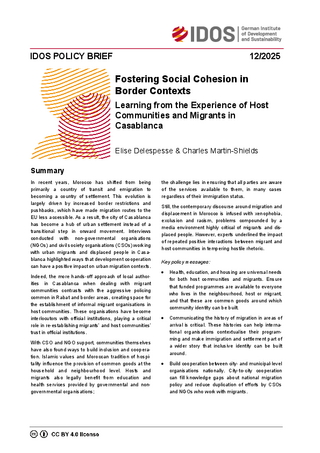Fostering social cohesion in border contexts: learning from the experience of host communities and migrants in Casablanca
Delespesse, Elise / Charles Martin-ShieldsPolicy Brief (12/2025)
Bonn: German Institute of Development and Sustainability (IDOS)
DOI: https://doi.org/10.23661/ipb12.2025
Frz. Ausg. u.d.T.:
Favoriser la cohésion sociale dans les contextes frontaliers: leçons tirées de l’expérience des communautés d’accueil et des migrants à Casablanca
(Policy Brief 1/2026)
In recent years, Morocco has shifted from being primarily a country of transit and emigration to becoming a country of settlement. This evolution is largely driven by increased border restrictions and pushbacks, which have made migration routes to the EU less accessible. As a result, the city of Casablanca has become a hub of urban settlement instead of a transitional step in onward movement. Interviews conducted with non-governmental organisations (NGOs) and civil society organisations (CSOs) working with urban migrants and displaced people in Casablanca highlighted ways that development cooperation can have a positive impact on urban migration contexts.
Indeed, the more hands-off approach of local authorities in Casablanca when dealing with migrant communities contrasts with the aggressive policing common in Rabat and border areas, creating space for the establishment of informal migrant organisations in host communities. These organisations have become interlocutors with official institutions, playing a critical role in re-establishing migrants’ and host communities’ trust in official institutions.
With CSO and NGO support, communities themselves have also found ways to build inclusion and cooperation. Islamic values and Moroccan tradition of hospitality influence the provision of common goods at the household and neighbourhood level. Hosts and migrants also legally benefit from education and health services provided by governmental and non-governmental organisations;
the challenge lies in ensuring that all parties are aware of the services available to them, in many cases regardless of their immigration status. Still, the contemporary discourse around migration and displacement in Morocco is infused with xenophobia, exclusion and racism, problems compounded by a media environment highly critical of migrants and displaced people. However, experts underlined the impact of repeated positive interactions between migrant and host communities in tempering hostile rhetoric.
Key policy messages:
• Health, education, and housing are universal needs for both host communities and migrants. Ensure that funded programmes are available to everyone who lives in the neighbourhood, host or migrant, and that these are common goods around which community identity can be built.
• Communicating the history of migration in areas of arrival is critical. These histories can help international organisations contextualise their programming and make immigration and settlement part of a wider story that inclusive identity can be built around.
• Build cooperation between city- and municipal-level organisations nationally. City-to-city cooperation can fill knowledge gaps about national migration policy and reduce duplication of efforts by CSOs and NGOs who work with migrants.
Elise Delespesse is an independent consultant based in Bonn, Germany.


